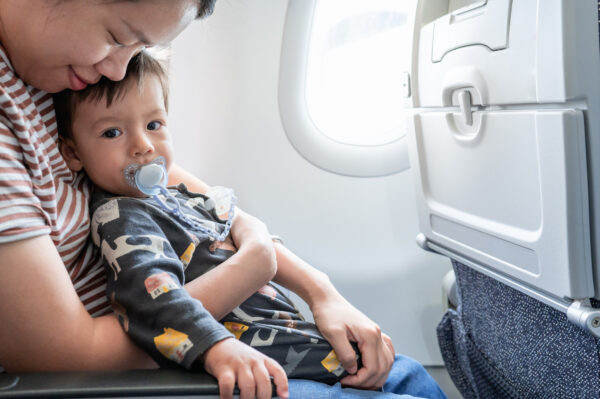 Traveling with babies can bring on a lot of stress — not to mention unwanted judgmental stares and extra luggage. Add breastfeeding and pumping milk to the mix, and it’s no wonder many moms are left anxious and frazzled when rushing to catch a flight for a much-needed getaway.
Traveling with babies can bring on a lot of stress — not to mention unwanted judgmental stares and extra luggage. Add breastfeeding and pumping milk to the mix, and it’s no wonder many moms are left anxious and frazzled when rushing to catch a flight for a much-needed getaway.
“The rules and regulations for packing breast milk and all the equipment that comes along with it can be confusing to moms,” said Liz Maseth, a nurse and Internationally Board certified lactation consultant at Akron Children’s. “Luckily, TSA has developed modified screening procedures for infants and children to help ease the process.”
With a little bit of upfront planning and knowledge of Transportation Security Administration (TSA) rules, moms can fly through airport security hassle-free. So before you book your next flight, here’s what you need to know, according to TSA guidelines.
Does breast milk and formula follow TSA liquid restrictions?
TSA clearly states, “Formula, breast milk and juice in quantities greater than 3.4 ounces or 100 milliliters are allowed in carry-on baggage and do not need to fit within a quart-sized bag.”
Beware, however, because TSA goes on to state parents are only allowed to bring a “reasonable quantity” of formula, breast milk and juice through the security checkpoint, which leaves discretion to the individual officer.
For ease of screening, inform the TSA officer at the beginning of the screening process that you are carrying breast milk in excess of 3.4 ounces in your carry-on bag. Also, be sure to remove it from your bag to be screened separately from the rest of your belongings. Typically, these liquids are screened by X-ray.
To test liquids for explosives or concealed prohibited items, TSA officers may ask you to open the container and have you transfer a small quantity of the liquid to a separate empty container or dispose of a small quantity, if feasible. You can ask a TSA officer to put on a fresh pair of gloves when handling your breast milk.
Does breast milk and formula have to be X-rayed?
The Food and Drug Administration states that there are no known adverse effects from eating food, drinking beverages and using medicine screened by X-ray.
However, if you’re still uncomfortable with it, you can inform the TSA officer you do not want the breast milk and formula to be X-rayed or opened. In this case, you may be subject to additional screening procedures, such as a pat-down and inspection of your other carry-ons, to clear the liquid.

Breastmilk and formula do not follow TSA’s liquid restrictions and are allowed in carry-on baggage.
Are freezer packs allowed?
Ice packs, freezer packs, frozen gel packs and other accessories required to cool breast milk are allowed in carry-ons. Beware though, if these accessories are partially frozen or slushy, they are subject to additional screening.
You may also bring gel or liquid-filled teethers, canned, jarred and processed baby food in carry-on baggage. Again, these items may be subject to additional screening, though.
Are breast pumps considered a medical device?
The Federal Drug Administration does consider breast pumps as medical devices and allows travelers to bring them in their carry-ons. However, the FDA leaves it up to individual airlines to interpret the rule as they wish.
For example, some airlines count a breast pump toward your allotted number of carry-ons, while others do not. Other airlines require passengers to flag breast pumps as a medical device 48 hours before departure.
Be sure to contact the airline prior to departure to find out its specific policies regarding breast pumps and medical devices.
Do I have to be traveling with my baby to bring breast milk?
The TSA states that you do not need to travel with your baby to bring breast milk. However, this rule only applies to travel within the United States. International policies vary.
To be on the safe side, be sure to allow extra time for travel and getting through the security checkpoint. You also can check ahead of time if the airport has lactation rooms.
It’s also a good idea to print the TSA guidelines, just in case you run into an officer who isn’t as familiar around the rules of traveling with breast milk. Should you encounter any issues, you can contact TSA directly at 866-289-9673.
Milk shipping opportunities are available for moms who want to ship milk to their destination.
For more information about breastfeeding and traveling, contact Liz Maseth at 330-543-4531. Virtual Visits are available.










